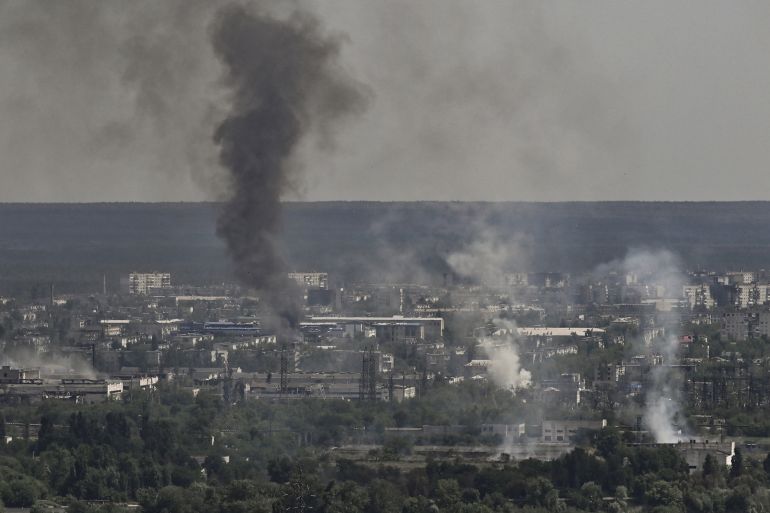What does Russia’s capture of Severodonetsk mean for Ukraine?
Ukrainian forces are retreating from the eastern city after weeks of fierce fighting, but some analysts say Moscow’s victory is symbolic, rather than strategic.

Kyiv, Ukraine – The loss of the southeastern town of Severodonetsk is far more significant and symbolic to Russia than to Ukraine, military analysts have told Al Jazeera.
On Friday, Ukrainian forces were abandoning the town in the Luhansk region, after weeks of fierce fighting.
Keep reading
list of 4 itemsUkraine war: Is Kazakhstan going cool on Russia?
Russian-appointed official in occupied Kherson killed in blast
Kaliningrad standoff could reveal if Russia wants to ‘escalate’
“Keeping positions smashed to pieces over many months just for the sake of staying there doesn’t make sense,” regional governor Serhiy Haidai said in televised remarks.
Heavy Russian bombardment has destroyed almost every defence position of the Ukrainian forces in the area, but the fall of the nearly-destroyed town is insignificant, a top military expert said.
“It’s a minor loss, there’s still Lysychansk [the neighboring town controlled by Ukraine], and Severodonetsk has largely served its purpose,” Ihor Romanenko, former deputy chief of Ukraine’s general staff of armed forces, told Al Jazeera.
The Kremlin is trumpeting the takeover of Severodonetsk because it remained one of the few Ukrainian-controlled towns in Luhansk, one of Ukraine’s smallest and poorest regions that was partially taken over by pro-Russian separatists in 2014.
“There is a geopolitical component for Russians, it’s a district centre in the unoccupied part of Luhansk. But we will live through it, we are more interested in the military aspect,” Romanenko said.
The claimed Russian victory in Luhansk was so important to Moscow that it ordered the redeployment of its troops from the occupied southern region of Kherson, and the partially-occupied Zaporizhzhia, where Ukrainian forces are regaining ground, Romanenko said.
Western and Russian analysts agree with him.
“The loss of Severodonetsk is a loss for Ukraine in the sense that any terrain captured by Russian forces is a loss – but the battle of Severodonetsk will not be a decisive Russian victory,” concluded the Institute for War, a US think tank that has been closely following the war since it began exactly four months ago, on February 24.
Two months of intense fighting also significantly decimated Russian forces in Severodonetsk, where the pre-war population was about 100,000.
“Ukraine has ground down a significant mass of Russian troops and retreated,” Pavel Luzin, a Russian-based expert with the Jamestown Foundation, a think tank in Washington, DC, told Al Jazeera.
To some observers, Moscow’s long-term perspectives in the war do not look promising because of heavy losses and demoralised manpower amid Western sanctions that prevent the production of high-precision weaponry.
“Time works against Russia [because] its military potential is largely irreplaceable,” he said.
Severodonetsk stands on the Siversky Donets river that the Russians have unsuccessfully tried to cross several times – with heavy losses of manpower and armoured vehicles.
One reason Severodonetsk fell was because of Russia’s superiority in artillery.
Moscow has used multiple rocket launchers, bombers and even outdated Tochka U cruise missiles to pound Ukrainian positions and residential areas.
“Aviation is working. Tochka Us are working. A whole set of artillery. They are advancing in all directions,” Roman Vlasenko of the Severodonetsk administration said in televised remarks on Friday.
However, the takeover of the entire Luhansk region – which seems imminent after the potential fall of Lysychansk – will not bring about the victory Russian President Vladimir Putin wants.
Months ago, Russian troops failed to seize Kyiv and northern Ukraine, losing thousands of troops and hundreds of tanks and armoured vehicles – as they were accused of committing war crimes against civilians.
They retreated in early April, and Putin said Russia would focus on capturing the Donbas region that includes Luhansk and Donetsk.
But at least two-fifths of Donetsk, a far larger and more populated province, is still controlled by Ukrainian forces.
They have built extensive defence installations there since rebels seized a third of Donetsk in 2014 – and taking them over will prove far more difficult than seizing Luhansk.
Meanwhile, the immediate economic consequences of losing all of Luhansk are minimal.
The industrial core of Luhansk with dozens of plants, power stations and coal mines has been under the rebels’ control since 2014, while the Kyiv-controlled part was mostly farmland.
The only industrial pockets there were the chemical and cellulose plants in Severodonetsk, Lysychansk and the town of Rubizhne that had been taken over in early May.
The plants almost stopped working because of the hostilities and shifting front line, Kyiv-based analyst Aleksey Kushch said.
“The economic effect is minuscule,” he told Al Jazeera.
The loss of Mariupol, that served as an administrative capital of the Ukrainian-controlled part of Donetsk, was far more consequential because the city was a crucial seaport and had two giant steel plants that accounted for a sizeable part of Ukraine’s steel output, he said.
Meanwhile, the fighting over Severodonetsk showed that Ukrainian forces could soon achieve parity with Russian troops as Moscow is losing reserves, morale and reliable weaponry.
“They are exhausted,” military expert Romanenko said of the Russians.
As Ukraine reorganised its troops following the defeat, the Kremlin maintained its widely criticised narrative that today’s Europe is similar to Nazi Germany under Adolf Hitler.
“When World War II was about to begin, Hitler gathered a significant part, if not most of the European nations, for a war against the USSR,” Russian foreign minister Sergey Lavrov said on Friday. “These days, the European Union together with NATO are gathering a modern-day coalition to wage a war on the Russian Federation.”